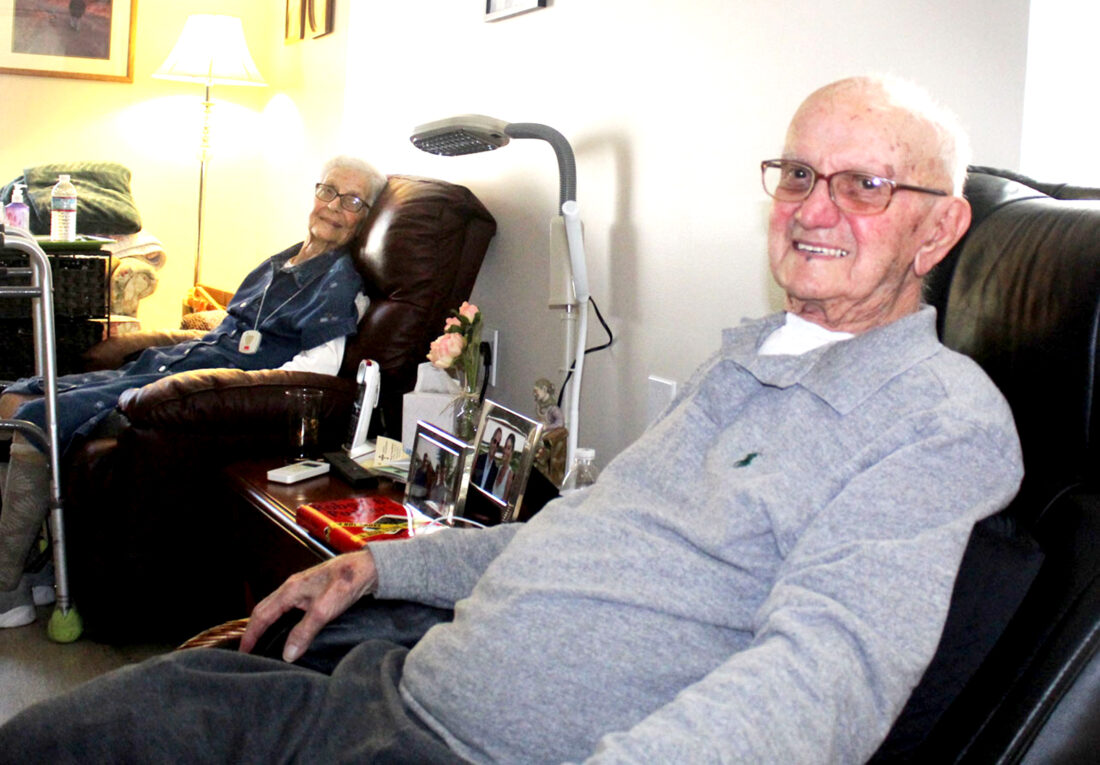Tales from the golf links, the curling rinks, the founding of BG and his days as the WWII bombadeer who nearly blew up Patton

(Telegraph photo by DEAN SHALHOUP) Longtime Nashua residents Ben and Lee Lupica are settling into their new home at a Nashua seniors residence after more than 60 years in the Ohio Avenue home they bought for $19,000.
I caught up the other day with longtime family friend Ben Lupica and his bride of 70-plus years, Lee, thanks to a couple of calls from folks close to them who still marvel over their knack, especially Ben’s, of spinning tales built upon life experiences that run the gamut from tragic and sad to humorous and fascinating.
Natives of the smallish, central New York town of Sherrill, a suburb of Oneida perhaps known best as the headquarters of the international flatware manufacturing firm Liberty Tabletop Flatware, Lee and Ben Lupica came to Nashua some 60 years ago, settling into a modest home on Ohio Avenue that happened to be the model home for a new development adjacent to Nashua Country Club where most all of the streets are named after states.
There they stayed, raising son Mike – yes, the Mike Lupica of sportswriting and book-authoring fame – and daughter Susan, now a counselor and therapist in San Francisco, until selling the house just recently and moving into a local senior residence.
A search of Ben Lupica’s name turns up literally hundreds of mentions on the sports pages, the vast majority in the results of golf league matches and tournaments.
“Well, the way I played, it would be awfully hard to call it golf,” Lupica said with a grin and a confession: “I was a 32 handicap.”
He also got involved in curling. “I was a little bit better at that,” he said.
Just after the Lupicas came to Nashua, word began going around that the Roman Catholic Diocese was contemplating building a Catholic high school for boys in Nashua. Benefactors began coming forward, Lupica among them, but one in particular stood out well above the rest.
Bishop Guertin “would never have been built if it wasn’t for Larry Elliott,” Lupica said, referring to the late Nashua businessman whose donations, both financially and in-kind, was key in laying the groundwork for the future school.
Elliott’s generosity knew no bounds when it came to supporting BG, Lupica remembers. While much of what he did for the school took place behind the scenes, he also came up with public events, which brings to mind perhaps the most prolific of all: The annual Sportsman’s Dinner, a $100-a-plate affair put on by the BG Men’s Club.
Featuring amenities unheard of these days, such as an open bar stocked with high-end liquor and ice buckets full of bottled beer, the dinners consisted of thick, prime steaks that Men’s Club members grilled to perfection in the school parking lot – under the watchful eye of Elliott.
As for his military career, Lupica, now 98 1/2, remembers being sent to basic training in Florida at age 18. Until then, the farthest he’d been from home was Albany, 67 miles away from his hometown.
He wasn’t alone. “Most of these kids, this was the farthest they’d ever been from home,” he said.
More seasoned soldiers assured the “kids” that “everyone is here to help you,” Lupica recalled. He learned that first-hand one night when he fell ill just as his group was preparing for deployment.
“A sergeant stayed with me all night, to make sure I was OK,” he said. “He took care of me so I could leave the next morning. I’ll never forget that guy.”
Later transferred to Fort Dix in New Jersey, Lupica found himself in the midst of “the boys from New York,” a decidedly more street-smart and survival-minded group.
“An 18-year-old kid from New York was about five years older than you,” he said, referring to the city kids who grew up faster in the big city.
Lupica pauses, looks down in thought for a moment and shakes his head slowly.
“You know, I can’t imagine an 18-year-old kid of today doing what we 18-year-old kids did back then,” he said. Another pause. “I look back, and sometimes I have trouble believing it myself,” he said, referring to how quickly so many teenagers like himself adapted to life as a soldier.
Among the unforgettable – and just as many forgettable – adventures Lupica faced as a bombadeer during the active-duty portion of his Air Force career is a particular bombing mission over Germany.
“We were on a run … the order was to take ’em out and go back,” he said, referring to the briefing he and the other six bombadeers in his squadron got before taking off.
But weather conditions were such when the squadron approached the targets that the fliers couldn’t see the ground, meaning they weren’t allowed by regulations to drop their bombs.
Lupica, as the lead pilot, was tasked with deciding whether to carry out the bombing or call it off due to the conditions. Despite urging by “the guy behind me” to follow through with the bombing, Lupica stood by his decision.
Had he given in and agreed to go ahead with the bombing, the bombs would have taken out not the enemy, but American forces – under the command, no less, of Gen. George C. Patton.
“They had moved farther along than we were told at the briefing,” Lupica said of the American troops. One shudders to think what would have happened had Lupica not stood by his decision.
Growing up a person of faith, Lupica called upon that faith more than a few times during his years as a soldier.
He recalls that after being involved in seven bombing missions over Vienna, he sought out a priest. “I went to confession, said ‘Father, I feel so bad killing so many kids,'” he told the priest.
“He says, ‘don’t feel bad … when you boys jump out of airplanes, the Germans are shooting at you as you’re parachuting down.’
“I look back on that part of my life … the Lord took care of me while I was there, because I came back every time.”
Dean Shalhoup’s column appears weekly in The Sunday Telegraph. He may be reached at 594-1256 or dshalhoup@nashuatelegraph.com.



